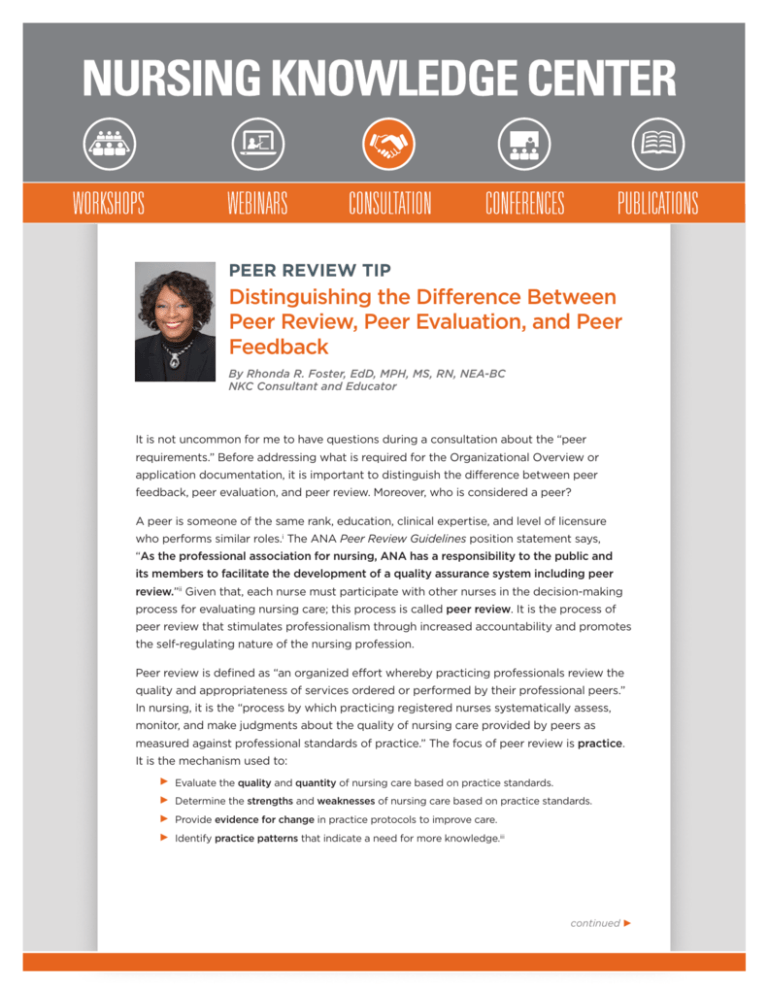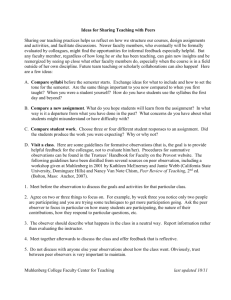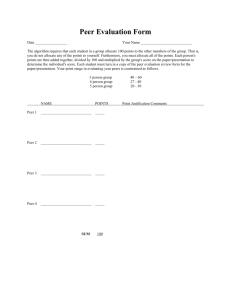
PEER REVIEW TIP
Distinguishing the Difference Between
Peer Review, Peer Evaluation, and Peer
Feedback
By Rhonda R. Foster, EdD, MPH, MS, RN, NEA-BC
NKC Consultant and Educator
It is not uncommon for me to have questions during a consultation about the “peer
requirements.” Before addressing what is required for the Organizational Overview or
application documentation, it is important to distinguish the difference between peer
feedback, peer evaluation, and peer review. Moreover, who is considered a peer?
A peer is someone of the same rank, education, clinical expertise, and level of licensure
who performs similar roles.i The ANA Peer Review Guidelines position statement says,
“As the professional association for nursing, ANA has a responsibility to the public and
its members to facilitate the development of a quality assurance system including peer
review.”ii Given that, each nurse must participate with other nurses in the decision-making
process for evaluating nursing care; this process is called peer review. It is the process of
peer review that stimulates professionalism through increased accountability and promotes
the self-regulating nature of the nursing profession.
Peer review is defined as “an organized effort whereby practicing professionals review the
quality and appropriateness of services ordered or performed by their professional peers.”
In nursing, it is the “process by which practicing registered nurses systematically assess,
monitor, and make judgments about the quality of nursing care provided by peers as
measured against professional standards of practice.” The focus of peer review is practice.
It is the mechanism used to:
▶▶
Evaluate the quality and quantity of nursing care based on practice standards.
▶▶
Determine the strengths and weaknesses of nursing care based on practice standards.
▶▶
Provide evidence for change in practice protocols to improve care.
▶▶
Identify practice patterns that indicate a need for more knowledge.iii
continued ►
Peer review is not intended to be punitive or anonymous. In addition to consideration
of the rank of the nurse and nursing practice, it is intended to take into account the
developmental stage of the nurse, to foster a continuous learning culture of patient safety
and best practice, and to provide feedback that is continuous, timely, and routine.
Peer evaluation is an element of performance evaluation and is generally linked to
professional goals, compensation, and consequences. Peer evaluation is always completed
by a peer, but if it is done as a part of a 360-degree process, all members of the
contributing team (some may or may not be peers) should complete the evaluation. Peer
evaluation is voluntary; peer review is not. Conducting 360-degree evaluations is an option
for the organization; peer review is NOT optional for a professional.iv
The Organizational Overview (OO-10) requires evidence of the following documents for
nurses at all levels (staff nurses up to the CNO):v
▶▶
Self-appraisal tools
▶▶
Peer feedback tools
▶▶
Performance review tools
The self-appraisal tool, sometimes referred to as the self-evaluation, is the tool that the
individual utilizes to evaluate his or her own performance against specific standards,
goals, and objectives. The peer feedback tool is the tool used by peers to evaluate their
peer’s performance against specific organizational standards, goals, and objectives. It is
designed to provide input based on observed performance and enables the receiver to
have an understanding about personal and professional strengths and gaps in practice or
performance. Peer feedback is a way for a staff member to gain additional insight about
his or her performance and/or validate a personal perspective or point of view.vi It should
enable the receiver to walk away understanding exactly what he or she did and the impact.
Exemplary Professional Practice (EP15) states,
“Nurses at all levels engage in periodic formal performance reviews that include a selfappraisal and peer feedback process for assurance of competence and continuous
professional development.
▶▶
Provide one example, with supporting evidence, of clinical nurses using periodic formal
performance review that includes a self-appraisal and peer feedback process to enhance
competence or professional development.
AND
▶▶
Provide one example, with supporting evidence, of nurse leaders using periodic formal
performance review that includes a self-appraisal and peer feedback process to enhance
competence or professional development.
Note: The CNO and nurse educators are included in nurse leaders.”vii
continued ►
As you can see, the requirements are specific and it is imperative that the terms not be
confused, as the performance review, self-appraisal, and peer feedback processes are
specifically designed in this source of evidence to enhance the competence or professional
development of the clinical nurse or leader.
In conclusion, nurses are responsible for assessing their own competence.viii Competence is
a self-regulating duty. Nurses are responsible for both peer and self-assessments and must
strive for excellence in their nursing practice, whatever the role or setting.
Barbara Haag-Heitman and Vicki George; Nursing Peer Review: Principles and Practice; American Nurse
Today; September 2011; Volume 6, Number 9; p 48-52.
i
ii Peer Review Guidelines; American Nurses Association; 1988.
iii
arbara Haag-Heitman and Vicki George; Peer Review in Nursing: Principles for Successful Practice; Jones
B
and Bartlett Publishers; 2011.
Jennifer M. Dupee, MBA, BSN, RN; Neysa P. Ernst, BSN, RN; and E. Kelly Caslin, BSN, RN; Does Multisource
Feedback Influence Performance Appraisal Satisfaction?; Nursing Management; August 2014; p 10-20.
iv
v 2014 Magnet® Application Manual.
vi Peer Feedback: Learning from College of Registered Nurses British Columbia; May 2006; p 1-4.
vii 2014 Magnet® Application Manual.
viii Code of Ethics for Nurses with Interpretive Statements; American Nurses Association; 2015; p 16 and 22.
This article was originally published in August 2015.
WE ARE HERE TO HELP
Looking for advice, education, or assistance on your journey?
Nursing Knowledge Center consultants are experts on
ANCC Magnet Recognition®, Pathway to Excellence®, and
continuing nursing education accreditation.
Contact consultation@ana.org or call 1.800.284.2378.
www.nursingknowledgecenter.org/consultation
©2015 American Nurses Association (ANA), 8515 Georgia Avenue, Suite 400, Silver Spring, MD 20910-3492. All rights reserved.
ANCC Magnet Recognition®, Magnet Recognition Program®, Magnet®, and the Pathway to Excellence® Program are registered
trademarks of the American Nurses Credentialing Center (ANCC).
Use of these or any other course(s)/material(s)/service(s) does not imply eligibility for or successful performance in the
submission of organizational credential applications, nor is it a requirement to qualify for designation, accreditation, or renewal.
American Nurses Credentialing Center does not endorse any products or services.
RhondaCollabTip0815 08/15 ELIT









